Our newest committee, the Awards Nominations Committee now oversees the criteria of, and nominations processes for, each of our awards.
Marta Acácio
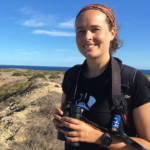 Marta is a Postdoctoral Researcher at the Tel Aviv University, and she is dedicated to the study of movement ecology, combining novel tracking technologies and fieldwork to further understand bird movement. Her current research focuses on the movement ecology of Griffon Vultures in Israel, where they are critically endangered. She is aiming to understand how griffons adapt their movement behaviour throughout their lives, aiming to help in their conservation. During her PhD at the University of East Anglia, Marta studied how individuals adapt their movement behaviour to the environmental conditions and in response to human-induced environmental change, using white-storks and shoebills as study species.
Marta is a Postdoctoral Researcher at the Tel Aviv University, and she is dedicated to the study of movement ecology, combining novel tracking technologies and fieldwork to further understand bird movement. Her current research focuses on the movement ecology of Griffon Vultures in Israel, where they are critically endangered. She is aiming to understand how griffons adapt their movement behaviour throughout their lives, aiming to help in their conservation. During her PhD at the University of East Anglia, Marta studied how individuals adapt their movement behaviour to the environmental conditions and in response to human-induced environmental change, using white-storks and shoebills as study species.
Adham Ashton-Butt
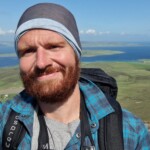 Adham is a Senior Research Ecologist at the British Trust for Ornithology. His work centers around the use of a broad variety of data types (bioacoustic, tracking, satellite, citizen science) to answer ecological questions with a focus on combatting the biodiversity crisis.
Adham is a Senior Research Ecologist at the British Trust for Ornithology. His work centers around the use of a broad variety of data types (bioacoustic, tracking, satellite, citizen science) to answer ecological questions with a focus on combatting the biodiversity crisis.
Adham loves being outdoors, whether in the field, collecting data, or hiking (with his binoculars), and also likes to combine his passion for bird ringing with his passion for travel.
Martin Beal
 Martin’s research is centred on understanding animal movement and translating these understandings into useful outputs for conservation, with a particular focus on coastal birds, seabirds and sea turtles. Martin is particularly interested in collaborative work that brings together people, data, and organizations to provide novel insights into commonly shared problems, such as identifying conservation priority sites with limited information. Martin’s current work is focused on leveraging different types of individual-level movement data to characterize movement networks of long-distance migratory birds, such as the Black-tailed Godwit. Otherwise in life, Martin is a (keen but a little lazy) birdwatcher, (oft-injured) rock climber, and a (wannabe) bookworm.
Martin’s research is centred on understanding animal movement and translating these understandings into useful outputs for conservation, with a particular focus on coastal birds, seabirds and sea turtles. Martin is particularly interested in collaborative work that brings together people, data, and organizations to provide novel insights into commonly shared problems, such as identifying conservation priority sites with limited information. Martin’s current work is focused on leveraging different types of individual-level movement data to characterize movement networks of long-distance migratory birds, such as the Black-tailed Godwit. Otherwise in life, Martin is a (keen but a little lazy) birdwatcher, (oft-injured) rock climber, and a (wannabe) bookworm.
Follow Martin on Twitter @SeabirdStudent
Annette Fayet
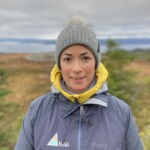 Annette is a seabird ecologist, and a researcher at the Norwegian Institute for Nature Research, where she co-leads the long-term seabird monitoring programme on Røst in Northern Norway. Before moving to Norway, she was based at the University of Oxford in the UK, where her main field site was Skomer Island in Wales. Her research investigates drivers of foraging and migration movements in North Atlantic and tropical seabirds.
Annette is a seabird ecologist, and a researcher at the Norwegian Institute for Nature Research, where she co-leads the long-term seabird monitoring programme on Røst in Northern Norway. Before moving to Norway, she was based at the University of Oxford in the UK, where her main field site was Skomer Island in Wales. Her research investigates drivers of foraging and migration movements in North Atlantic and tropical seabirds.
Follow Annette on Twitter @AnnetteFayet
Natasha Gillies
 Natasha is a postdoc at the University of Liverpool, UK, where her main research involves using long-term, high-resolution biologging data to explore individual variation in foraging behaviour in albatrosses (wandering and black-browed), how this relates to their breeding success, and how this is shaped by environmental variation. Alongside this work, she has been helping to develop new GPS tracking methods for Arctic seabirds in Svalbard. During her PhD at University of Oxford, UK, she studied parental care in seabirds, exploring the mechanisms by which pairs coordinate their behaviour and what consequences this has for their reproductive success.
Natasha is a postdoc at the University of Liverpool, UK, where her main research involves using long-term, high-resolution biologging data to explore individual variation in foraging behaviour in albatrosses (wandering and black-browed), how this relates to their breeding success, and how this is shaped by environmental variation. Alongside this work, she has been helping to develop new GPS tracking methods for Arctic seabirds in Svalbard. During her PhD at University of Oxford, UK, she studied parental care in seabirds, exploring the mechanisms by which pairs coordinate their behaviour and what consequences this has for their reproductive success.
Follow Natasha on Twitter @tash_gillies
Robert Hawkes
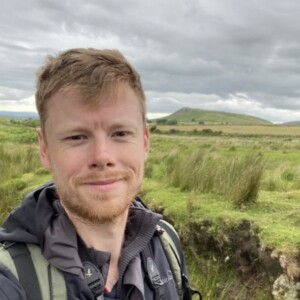 Robert is a conservation scientist at the RSPB. His research focuses on conservation solutions for priority UK species in agricultural and semi-natural landscapes, with a focus on agri-environment schemes. Although much of his research focuses on birds, he also works with land owners, ecologists and taxonomic experts to develop decision support tools for other species groups, including plants and invertebrates.
Robert is a conservation scientist at the RSPB. His research focuses on conservation solutions for priority UK species in agricultural and semi-natural landscapes, with a focus on agri-environment schemes. Although much of his research focuses on birds, he also works with land owners, ecologists and taxonomic experts to develop decision support tools for other species groups, including plants and invertebrates.
Follow Robert on Twitter @Robert_W_Hawkes
Kate Rogerson
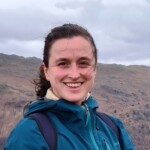 Kate is a marine ornithology specialist working at Natural England (on maternity leave until January 2024). Her work has focused on conservation requirements and pathways for marine birds across England alongside providing advice to developers of offshore windfarms regarding marine birds. Kate has previously worked at an environmental consultancy focusing on marine bird interactions with offshore renewables and monitoring of birds at Special Protection Areas.
Kate is a marine ornithology specialist working at Natural England (on maternity leave until January 2024). Her work has focused on conservation requirements and pathways for marine birds across England alongside providing advice to developers of offshore windfarms regarding marine birds. Kate has previously worked at an environmental consultancy focusing on marine bird interactions with offshore renewables and monitoring of birds at Special Protection Areas.
Kate undertook her PhD at the University of East Anglia studying the migration routes and patterns of white stork adults and juveniles using GPS transmitters. She undertook fieldwork throughout the breeding period to study the chicks growth in the nest and the natal areas, including the use of landfill sites as foraging sites.
Martyna Syposz
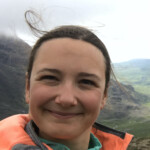 Martyna is a researcher exploring various threats posed on seabirds, including light pollution, plastic pollution and climate change. Currently, she is a post-doc at University of Gdansk and her research involves investigating Little Auk breeding phenology, behaviour and its nest microclimate in the warming Arctic environment. Previously, she studied the effects of light pollution on behaviour of Procellariiform seabirds. Juvenile seabirds come to light polluted areas near to their nesting site during the fledging season. She explored the mechanism driving this behaviour, but also tested how light pollution affects adults. Her experiments concluded that adult seabirds, unlike their young, avoid lit-up areas. She loves fieldwork and she has experience in working in very hot, cold and wet environments.
Martyna is a researcher exploring various threats posed on seabirds, including light pollution, plastic pollution and climate change. Currently, she is a post-doc at University of Gdansk and her research involves investigating Little Auk breeding phenology, behaviour and its nest microclimate in the warming Arctic environment. Previously, she studied the effects of light pollution on behaviour of Procellariiform seabirds. Juvenile seabirds come to light polluted areas near to their nesting site during the fledging season. She explored the mechanism driving this behaviour, but also tested how light pollution affects adults. Her experiments concluded that adult seabirds, unlike their young, avoid lit-up areas. She loves fieldwork and she has experience in working in very hot, cold and wet environments.
Follow Martyna on Twitter @martyna_syposz
Leila Walker
 Leila has responsibility for the day to day management and running of the BOU including conferences and events, the business side of the BOU’s journal, IBIS, social media and communications, website development and content management and servicing BOU Council and its Standing Committees.
Leila has responsibility for the day to day management and running of the BOU including conferences and events, the business side of the BOU’s journal, IBIS, social media and communications, website development and content management and servicing BOU Council and its Standing Committees.
Follow Leila on Twitter @leilakwalker


